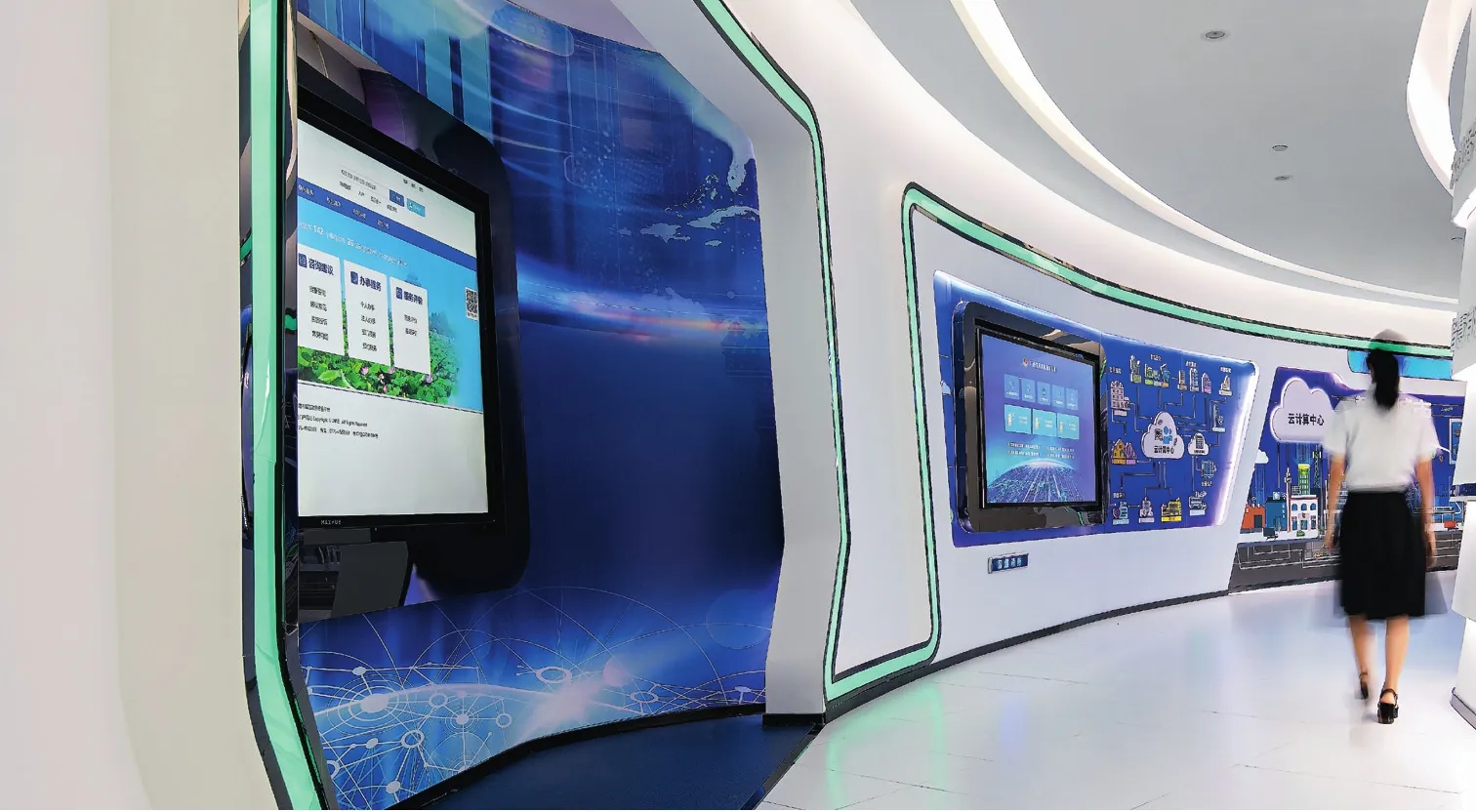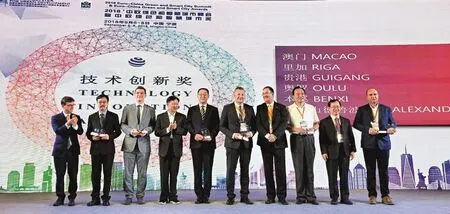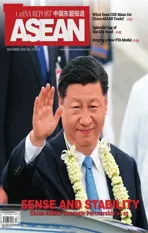A SMARTER CITY
2019-01-29ByTanXingyuYeCong
By Tan Xingyu, Ye Cong

Smart city management center in Guiguang.
Guiping No.2 Middle School is an ordinary educational institution hidden in the mountainous area of Guigang in China’s border region of Guangxi Zhuang Autonomous Region.Recently, students there attended several special classes taught by over 30 prestigious teachers via Guigang Cloud Computing Center miles away in the city proper.
“The teachers taught a lot of problem-solving skills, which are really helpful,” exclaimed Liang Ying,a student studying at the school.
“Development of smart cities is not only a direction for urban development, but also an important project for people’s livelihood,”stressed Li Xinyuan, the chief architect behind Guigang’s smart city construction and secretary of the Guigang Municipal Committee of the Communist Party of China. “It can bring tangible benefits to the people.”Li outlined the measures the city rolled out in this regard in an exclusive interview with China Report ASEAN.
Boosting Economy with New Ideas
As the city chief, Li has positioned local economic development atop the work agenda. Guigang is one of the starting points of the Maritime Silk Road and a key city of strategic significance along the Zhujiang-Xijiang Economic Belt thanks to its location as the most convenient gateway to the sea in southwest China.
Over the recent years, Guigang has witnessedflourishing traditional industries like building materials,metallurgy, sugar making and power supplies, as well as emerging sectors including new-energy cars, electric vehicles, electronic information,biopharmaceuticals and “all-forone” tourism. However, compared with developed cities, Guigang has been restricted by a weak economic base. Highlighting its unique competitiveness became a longstanding issue on Li’s mind.
In-depth integration of manufacturing with big data and artificial intelligence technologies led Li to realize the huge potential of the digital economy. “Humanity has entered a new era of the digital economy,” he declared. “Like capital and natural resources, data has become a driving force for economic growth. Alongside providing better services, a city chief should be forward-looking and prepare for the future by embedding the production and management of data into economic development. They should boost innovation-driven development by building a smart city.An urban governance system based on the big data will inject robust momentum into urban economic development in the new era.”
Guigang became one of China’s smart city pilots in August 2013.With the Party chief and city mayor leading a special working group,the campaign to make Guigang a smart city was officially launched in November 2017. The city was one of thefirst in China to introduce public-private-partnership (PPP)in this regard. Data from different sectors and government departments have been integrated into a unified platform, where new information will be constantly added by authorities in public security,transportation, tourism, civil affairs and other sectors. The data platform enhances residents’ daily life and lays a solid foundation for a steep local economic rise.
Achievements in Smart City Construction
Large quantities of unhusked rice go into a machine and come out as packed products. Robots next to the production line pack 1,200 bags of rice per hour. This is a typical scene at the workshop of the Yihai Kerry(Guigang) grain and oil processing project.
The smart city project is not only changing traditional industries,but also boosting emerging sectors.“Guigang’s economic foundation is weak,” continued Li. “With simple industrial structure, Guigang once ranked at the bottom of the industrialization ranking of Guangxi.But in recent years, we have seized opportunities to bolster emerging sectors like new-energy cars, electric vehicles, electronic information,biopharmaceuticals and others. In just three years, Guigang has built up a manufacturing base for electric vehicles, where 67 businesses have moved in. According to our plan,the manufacturing base will have production capacity of 700,000 newenergy cars with values reaching 100 billion yuan (US$14.4 billion).”
Li Xinyuan said the usage of the latest technologies such as information and communication networking, artificial intelligence and cloud computing is driving emerging sectors. By building an open data platform, a digital industrial cluster is taking shape inthe innovative technology park in Guigang, integrating big data, cloud computing, artificial intelligence,Internet of Things, integrated circuits, intelligent terminal manufacturing, and software and information technology. Due to construction of a smart city, the digital economy isflourishing in Guigang. It has become a demonstration city not only for Guangxi, but also for the nation thanks to its thriving businesses,green ecology and pleasant living environment.

Guigang wins the Technology Innovation Award at the Euro-China Green and Smart City Summit in September 2018.
While bringing new driving forces to the economy, smart city development has also profoundly changed approaches to urban management. For example, with the latest technology of Internet of Things, state-of-the-art intelligent sensors are installed under manhole covers to prevent them from being moved, stolen or hurting passersby. Similar technologies have been applied in a wide range of infrastructure facilities.
Since November 2017 when construction of a smart city began, Guigang has upgraded the information systems particularly for administrative management,public security, civil services and industrial development. Digital barriers have been broken, and an information sharing system has been built. At the China Smart City International Expo in August 2018,Guigang was hailed as one of the top four smart cities in China. At the Euro-China Green and Smart City Summit in September, Guigang won the Technology Innovation Award.As an authoritative source at the China Center for Urban Development under the National Development and Reform Commission of China illustrated, the most difficult part of building a smart city is connecting isolated information islands and enabling the freeflow of information among different departments.Guigang’s achievements in this regard are impressive already.
